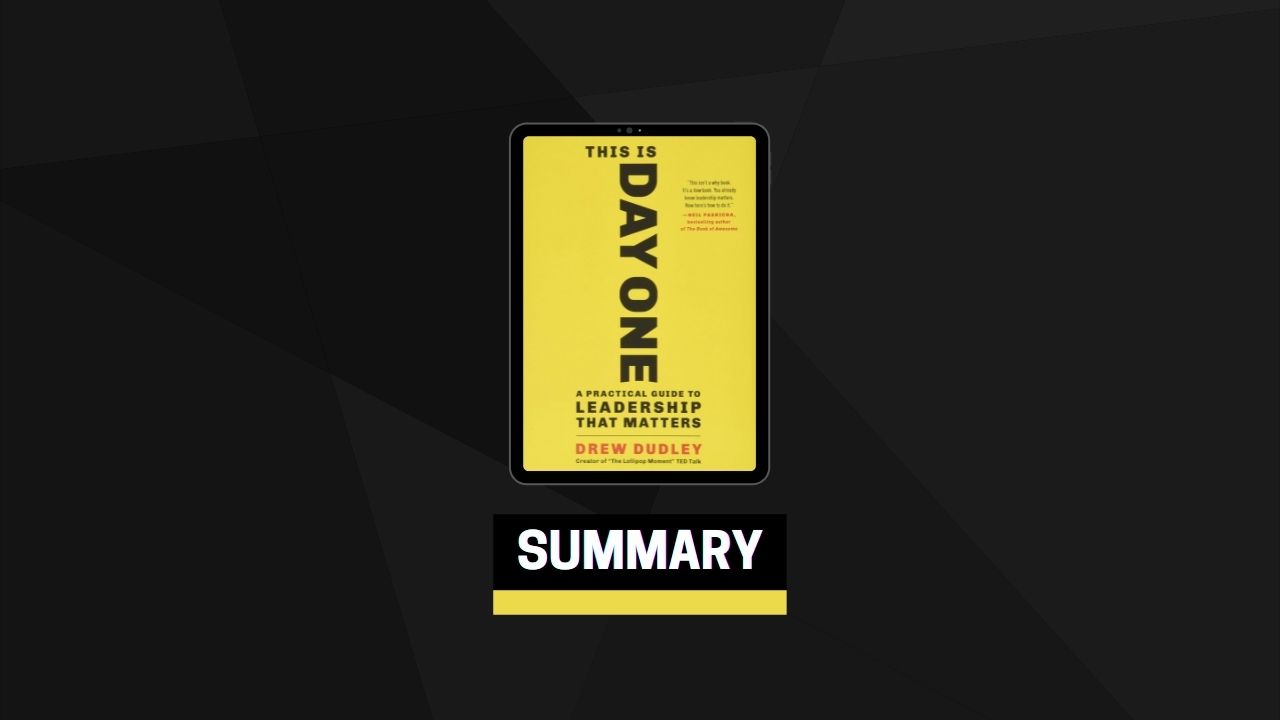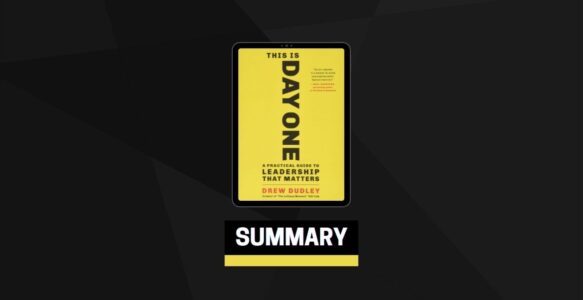This Is Day One
There are going to be a lot of difficult days on your journey to recognizing and applying your leadership, so here’s a fundamental premise of this book: you must treat every single one of those days like it’s Day One of your journey. This idea is not unique to this book: the concept is foundational in most addiction recovery programs, is a mindset adopted by elite athletes, and is a key business philosophy of some of the world’s biggest companies. This book applies the approach in a very specific context: personal leadership development.
Living Day One leadership means embracing the same philosophy: if you want to be a leader, choose to be a leader today. Repeat that choice every day. It doesn’t matter if you failed to do it yesterday or if you’ve done it every day for a decade: every new day begins with a recommitment to that choice.
Everyday Leadership
The nature and frequency of our extraordinary days are determined by how we behave on our ordinary days. Long-term success or failure is fostered in our ordinary days. Our true character, and that of our teams, is revealed by how we behave in our ordinary days.
Instead we keep count of our extraordinary days and try to close the gap between how many extraordinary days we’ve had and how many we feel we need to really “matter” in this world. In our minds closing that gap requires big things: promotions, athletic accomplishments, a wedding, the birth of a child. We believe it’s the big things in our lives that move us toward the point where we matter, and big things happen over time. Focusing on the simple, everyday things isn’t going to close that gap.
But simple doesn’t mean little. Simple, consistent, impactful behaviors are what generate the momentum needed to accomplish the most significant things in our lives.
Your Personal Leadership Philosophy
A personal leadership philosophy is a set of beliefs and principles you use to evaluate information and respond to people and situations.
If you can’t tell me your personal leadership philosophy in under thirty seconds; if you can but it’s the first time you’ve articulated it out loud in the past three days; or if someone who works with you closely cannot tell me your personal leadership philosophy—you don’t actually have one. At least not one that is truly impacting the way you behave.
It’s difficult sometimes to reflect on macro-level questions like this one, but developing an answer is crucial. Your personal leadership philosophy isn’t just a “nice thing to have”; research has proven that it makes you impact others in a more positive way. If you don’t have a personal leadership philosophy, you don’t have a plan for leading every day: you’re hoping to lead, you’re not planning to lead.
“Could You Explain What That Word Means?”
If you don’t take the time to define the things that you hope will define you, you’re always going to feel as if you aren’t living up to the person you want to be.
ay One Leadership starts with a plan. A plan to put the following process into action:
- Identify a key value you wish to embody every day.
- Clearly define that value.
- Do something each day that embodies that value.
Operationalizing Your Leadership Values
Leaders aren’t identified by their jobs, they’re identified by how they choose to do them. When you do your job and live your life in a way that impacts others positively, you’re a leader—whether your job is commanding an aircraft carrier or getting someone’s child home safely after school.
The Big Six: The Six Key Leadership Values
#1 Impact
A commitment to creating moments that cause people to feel they are better off having interacted with you.
QUESTION: What have I done today to recognize someone else’s leadership?
If you’re going to start with a single question on Day One, start with this one. If you make this question a part of your life for thirty days, it will be a month of tremendous leadership generation on your part.
This question puts you on the lookout for moments of leadership. It makes it more likely you will examine the people with whom you interact each day and ask, “Who is creating moments that send others away feeling better than before?” More importantly, it ensures that when you do identify those individuals, you will be likely to seize the opportunity to recognize them, learn from them, and reinforce the behaviors that impressed you.
#2 Courage
A commitment to taking action when there is a possibility of loss.
QUESTION: What did I try today that I thought might not work, but I tried it anyway?
Leaders are always scared. They simply don’t let fear lead to inaction. The challenges that scare us can be as benign as asking someone out or as profound as facing a cancer diagnosis. Regardless of where on that spectrum our fears fall, it’s courage that allows us to act in the face of those fears.
It’s courage that defines leaders, not confidence. Courage is a commitment to taking action when there is a possibility of loss. Sometimes the potential loss is of something tangible: money, a job, or an opportunity. More often than not the potential loss that keeps us from acting is really a perceived loss: a loss of face. Losing face means losing respect or prestige in the eyes of others. If we continually hesitate to act because of concerns about what others think of us, our perception of and respect for ourselves will continually erode.
#3 Empowerment
A commitment to acting as a catalyst for the success of others.
QUESTION: What have I done today to make it more likely someone else will move closer to a goal?
Leaders don’t treat jobs and money as goals in and of themselves. Instead, they accept that jobs and money are the natural by-products that come to anyone who adds tremendous value. It is far better to put your energy, time, and focus into figuring out how you can add tremendous value rather than how you can make money and get jobs. It takes a leap of faith to make that shift in focus, but it is a leap that has paid off for me in every way imaginable. That payoff is available to anyone willing to ask, “Are the goals I’m chasing in my life actually my goals, or are they the natural by-products that would come to me if I became better at adding value?”
Living in an economy of abundance and focusing on adding value does not mean you have to give up on dreams of business success or personal financial wealth. Living in an economy of abundance does not mean that you don’t focus on profit
profit). It means you recognize that profit is only one type of value, and whoever adds the most value will inevitably reap the biggest profits: not just financially, but emotionally, socially, physically, and spiritually as well.
#4 Growth
A commitment to expanding the capacity to add value.
QUESTION: What did I do today to make it more likely someone would learn something?
If the value of empowerment is personally adding value to others, the value of growth is about becoming better at doing just that.
Growth is an expansion in the capacity to add value. You embody it any time you aim to increase someone’s ability to improve, yourself included. You embody growth any time you act as a catalyst for learning, any time you can answer the question: What have I done today to make it more likely someone will learn something?
As we get older it becomes all too easy to fill our lives with things that keep us busy but don’t keep us growing. Go too long without appreciable growth in your life and not only does it become difficult to see yourself as a leader, it becomes difficult to feel like you matter.
#5 Class
A commitment to treating people and situations better than they deserve to be treated.
QUESTION: How did I elevate instead of escalate today?
Class is elevating a situation when your instincts push you to escalate, when it would be easier to escalate and when you have every right to escalate. The difference lies in your goal for the resolution of the situation: elevating means trying to succeed, escalating means trying to win. Everyone can share in success, winning necessitates someone losing. People can find common ground in the search for success, but they defend their territory in a battle to win.
In his best-selling The 7 Habits of Highly Effective People, Stephen Covey identified the search for win-win situations as a key practice of effective leaders and shared an important insight for leaders looking to embody class:
Between stimulus and response there is space. In that space is our power to choose our response. In our response lies our growth and our freedom.
#6 Self-Respect
A commitment to making decisions that recognize four essential truths:
- You have as much right to happiness as anyone else.
- You cannot add value to anyone else’s life until you’ve added enough to your own.
- Your happiness is your responsibility.
- Happiness is not possible without forgiveness.
Treat Yourself First
There is no hole in your life that cannot be filled by self-respect. The Day One process aims to ensure you give yourself hard evidence every day that you are someone of worth: someone who matters and deserves respect. When you believe that of yourself, you treat others as if you believe it about them.
Why should we expect our bosses, coworkers, husbands, wives, children, strangers, or the universe to do something for us we’re not willing to do for ourselves: treat ourselves well? No one is going to respect you more than you respect yourself, and as such my question for embodying self-respect every day is a simple one: What have I done today to be good to myself?
Recognize That Happiness Must Be Cultivated
We’re capable of generating our own happiness on most days: by hitting the gym, having coffee with a friend, dancing in our living room, or eating that cupcake. However, there are some days when we are so stressed, so hurt, so exhausted, or have been hit by pain so significant we simply don’t have it in us to try to bring something good into our lives. It’s for those days that we must cultivate happiness.
Putting the Day One Process into Action
At this point you’ve taken the steps necessary to embrace the “This Is Day One” philosophy: you’ve identified the core values you wish to drive you and you’ve created a strategy to ensure you start living up to them each day. What you need now is practice and discipline to keep asking and answering your first question for a month so that you can add your second, then third, and so on.
There will be days when you’re not successful and that’s okay. The great thing about looking at each day as Day One is there’s no shame in doing something poorly on your first day. This process allows you to forgive yourself when you’re less than the person you want to be and keeps you from getting too full of yourself when you’ve been doing a good job.
Consistency is key: ordinary acts performed with extraordinary consistency change worlds. Make no mistake, you’re a world changer. Don’t be intimidated: remember there is no world, simply 7 billion understandings of it. Every time you change one person’s understanding of the world—be it an understanding of how many people care about them, of what they’re capable, or how powerful an agent for change they can be in this world or in their own life—you’ve changed the whole world. That’s not beneath you and it’s not beyond you.


